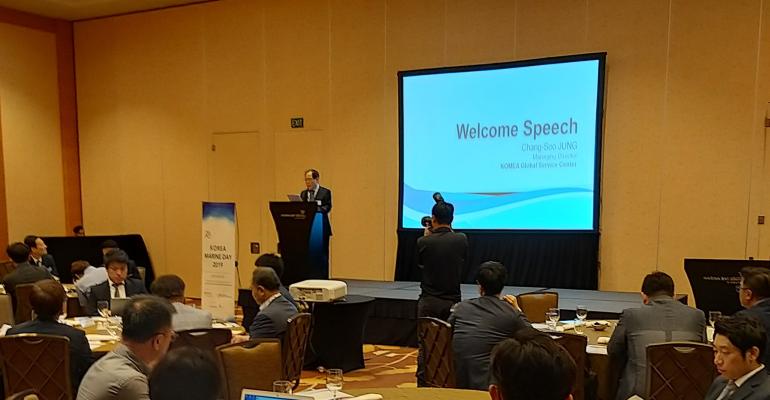Speakers at the Korea Marine Day 2019 event during Sea Asia 2019 in Singapore saw LNG carriers as a strong option for shipbuilders that have seen global orders fall back over the past decade from as high as 5,252 orders in 2007 to 1,105 in 2017.
The share of South Korean shipbuilders fell from 1,161 orders to 187 orders during the period, according to Clarksons Research.
Korea Trade-Investment Promotion Agency (KOTRA) director Byung-Kwon Kim expects a rise in eco-friendly marine solutions and equipment as the industry approaches the implementation of the IMO regulation, while Korea Marine Equipment Association (KOMEA) Global Service Center managing director Chang-Soo Jung noted increasing demand for scrubbers.
According to IHS Markit principal consultant Daejin Lee, 2,000 ships are either already fitted or earmarked for scrubber before January 2020, with uptake accelerating in the second two quarters of 2018. Scrubber adoption has continued to increase although the trend has softened in the first quarter of 2019, he added.
Lee added that time charter premiums have been quoted for tankers and dry bulk vessels fitted with scrubbers as charterers can compensate these through bunker fuel savings.
Concerns about the global sulphur cap are expected to dominate this year along with trade tensions between the US and China. The sulphur cap is expected to drive demand for LNG carriers, and Korean yards may have an advantage as they specialise in large technically sophisticated construction compared to Chinese and Japanese builder who focus on standard bulkers.
Among Korean yards, HHI had 24 LNG carrier orders in 2018 while DSME and SHI had 17 each.
Lee also believes that the sulphur cap will spur demand for product tankers as ships switch to marine gasoil from high sulphur fuel oil. "This will bring hope to smaller shipyards," he said.
He added Singapore shipbuilders, who have focussed more on the offshore market, may also turn their attention to product tankers. The city state accounts for around half of global bunker consumption.
Copyright © 2024. All rights reserved. Seatrade, a trading name of Informa Markets (UK) Limited.
Add Seatrade Maritime News to your Google News feed.  |


